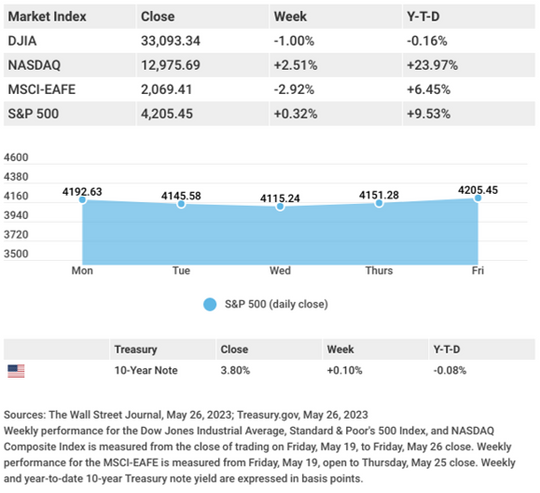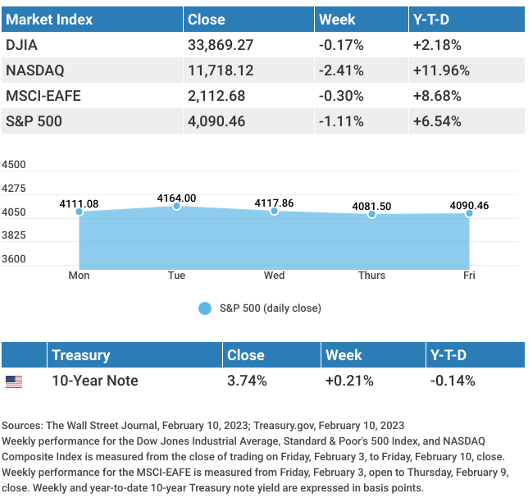Weekly Market Insights: Debt Deal Relieves Market Worries
|
Stocks surged higher in the closing days of a holiday-shortened trading week, ignited by a political resolution on raising the debt ceiling and a strong employment report. The Dow Jones Industrial Average rose 2.02%, while the Standard & Poor’s 500 advanced 1.83%. The Nasdaq Composite index gained 2.04% for the week. The MSCI EAFE index, which tracks developed overseas stock markets, slipped 0.52%.1,2,3 |
 |
 |
A Sigh of ReliefThe weight of uncertainty over negotiations to raise the federal debt ceiling was lifted last week by the news of an agreement between President Biden and House Speaker McCarthy and its subsequent passage in Congress. After a modest gain on Thursday following the House vote, stocks rallied on Friday, responding to the Senate passage of the debt ceiling bill, which eliminated a significant overhang to the market. A robust federal employment report also contributed to the Friday rally. The report exceeded market expectations in the growth of new jobs while reflecting a deceleration in wage growth. The Irrepressible Labor MarketLast week’s employment data showed that the labor market remains stout after over a year of sharp interest rate hikes. Job openings in April increased to more than 10 million, reversing three straight months of declines, while private sector employment increased by 278,000 jobs in May, according to a survey by Automated Data Processing (ADP), a significant payroll processor.4,5 In line with these strong numbers, the Department of Labor reported 339,000 new jobs were added in May. That came above the consensus estimate of 190,000 and marked the 29th consecutive month of positive growth.6 This Week: Key Economic DataMonday: Factory Orders. Institute of Supply Management (ISM) Services Index. Tuesday: Jobless Claims. Source: Econoday, June 2, 2023 This Week: Companies Reporting EarningsTuesday: The J. M. Smucker Company (SJM) Wednesday: Campbell Soup Company (CPB) Thursday: DocuSign (DOCU) Source: Zacks, June 2, 2023 |
 |
|
“I’m not embarrassed anymore about anything that people, that human beings are going through.” – Mary J. Blige |
 |
Owe the IRS Money? Here’s How to PayIf you owe federal taxes, you may be required to pay by the April deadline. Remember, if you get an extension to file your taxes, payment is still due by the April deadline. You can set up a payment plan if you can’t pay the full amount you owe now. Here are some choices for making your payment:
Tip adapted from IRS.gov7 |
 |
Eating To Your Heart’s ContentDeciding to change your diet can feel daunting. It can be challenging to figure out which one is “best” for you. Many fad diets come and go, but a few have stuck around, the most popular being the Mediterranean diet. The Mediterranean diet is more of a lifestyle shift toward healthier eating patterns. Modeled after principles of Italian and Greek cuisine, which have remained relatively unchanged since the 1960s, this diet may lead to lower rates of heart disease, type 2 diabetes, and other chronic illnesses. The diet emphasizes eating more fruits, vegetables, legumes, nuts, seeds, fatty fish, whole grains, olive oil, and fewer meats and dairy products. The diet is flexible. Elimination isn’t the intention, but rather favoring more nutrient-rich foods over energy-dense ones. Food is life, and healthy choices can help support a healthier life. While the Mediterranean diet could be a good option, no single diet will ideally fit everyone’s lifestyle, preferences, and health needs. So, discuss your dietary choices with your physician or registered dietitian first. Tip adapted from Mayo Clinic8 |
 |
|
A friend wants change for a dollar. All you have in your pocket are over a dollar in coins, but you still can’t make the change correctly. What is the largest amount of money you could have in this situation? What coins do you have that prevent you from making the change correctly?
Last week’s riddle: An eccentric farmer requests that you build four pens for his nine sheep but only allow an odd number of sheep in each pen. How do you accomplish this? Answer: Build three pens, each holding three sheep. Build a fourth pen surrounding the other pens, containing all nine sheep. |
 |
 |
|
Wave Rock Formation, Coyote Butte, Vermillion Cliffs, Arizona. |
|
|
Footnotes and Sources
2. The Wall Street Journal, June 2, 2023. 3. The Wall Street Journal, June 2, 2023. 4. The Wall Street Journal, May 31, 2023. 5. CNBC, June 1, 2023. 6. CNBC, June 2, 2023. 7. IRS.gov, February 15, 2023 8. Mayo Clinic, February 15, 2023 |















